The Best Meditation Apps for Every Level of Use
Have you ever wondered what meditation is all about but lacked motivation to start yourself? Meditation is something that anyone can practice and provides many mental health benefits. Allow us to introduce you to meditation and also help you find the best meditation app to help you get started.

Table Of Contents
- Top Picks
- What Is Meditation, Really?
- Can Anyone Meditate?
- Benefits of Using Meditation in Your Life
- — Improves Focus
- — Manages Anxiety & Depression
- — Improves Self-Esteem
- Meditation Tips for Beginners
- How to Choose the Best Meditation App for You
- Best Meditation Apps
- 1. InsightTimer
- 2. Headspace
- 3. Calm
- 4. iBreathe
- 5. The Mindfulness App
- 6. Let’s Meditate: Meditate, Relax & Sleep
- 7. Inscape
- 8. Breethe: Meditation & Sleep
- In Conclusion
Top Picks
Editor’s Choice: Inscape
Best for Beginners: The Mindfulness App
Best Free App: Calm
| Rank | Product | Highlights |
| #1 |  InsightTimer InsightTimer
|
|
| #2 |  Headspace Headspace
|
|
| #3 |  Calm CalmLearn More |
|
| #4 |  iBreathe iBreathe
|
|
| #5 |  The Mindfulness App The Mindfulness App
|
|
| #6 |  Let’s Meditate: Meditate, Relax & Sleep Let’s Meditate: Meditate, Relax & Sleep
|
|
| #7 |  Inscape Inscape
|
|
| #8 | 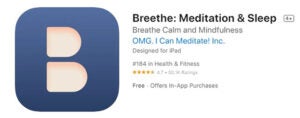 Breethe: Meditation & Sleep Breethe: Meditation & Sleep
|
|
What Is Meditation, Really?
Meditation can be defined as a collection of techniques used to cultivate a state of heightened awareness and focused concentration. Meditation is also a method that alters awareness and has been found to have various beneficial effects on psychological well-being.

Practiced for thousands of years, meditation was originally intended to aid in the development of a deeper awareness of life’s sacred and mystical powers.
Meditation is considered a form of supplementary treatment for the mind-body system. It can induce a profound feeling of relaxation and promote mental tranquility.
During meditation, you direct your concentration and clear your mind of the confused thoughts that may overwhelm your head and produce tension. This technique may have a beneficial effect on one’s physical and mental well-being.
Can Anyone Meditate?
Contrary to popular belief, meditation does not require remarkable spiritual powers. Anyone may practice meditation. Meditation needs a small amount of effort and a great deal of conviction, but the benefits are undeniable.

While there are times when the consequences of meditation are immediate, more often than not, you’ll need a great deal of patience to reap the long-term advantages. Thus, while it does require effort, you’ll be astonished at how much good a regular 20-minute meditation routine can do.
If you sit down to learn to meditate but have difficulty settling, guided meditation is an excellent alternative. You listen to a teacher guide you through a refreshing meditation session in this form of meditation. Once you’ve identified an instructor who motivates you to practice, the rest is a walk in the park.
Benefits of Using Meditation in Your Life
Meditation actually has scientifically-proven benefits, such as the ones listed below.
— Improves Focus
Mindfulness meditation trains you to pay attention to the current moment, which can help you concentrate better on other tasks in daily life. A 2011 Harvard Medical School study explored the effects of mindfulness meditation on the brain and discovered it is linked to processing new information.

The researchers analyzed the brains of seventeen participants before and after an eight-week meditation session. According to brain scans, gray matter increased in the areas of the brain important for memory, learning, and emotional control.
— Manages Anxiety & Depression
Mindfulness meditation teaches your mind to be present at the moment, making you less prone to obsess on worrisome ideas that might feed sadness.

According to a 2014 study published in JAMA Internal Medicine, mindful meditation can help alleviate anxiety and sadness and may be used in conjunction with other forms of mental health treatment.
The advantages of mindfulness-based stress reduction (a therapeutic approach that combines mindfulness meditation) have also been validated by research. MBSR has been known to assist people with anxiety in calming their minds and alleviating symptoms of depression, like insomnia, lack of appetite, and poor mood.
— Improves Self-Esteem
Meditation enables you to slow down, allowing for more in-depth self-reflection and can assist you in identifying positive aspects of yourself.

Mindfulness contributes to self-awareness by strengthening one’s capacity to evaluate one’s feelings and thoughts objectively, which results in increased self-esteem.
Other bits of research suggests that meditation can help with:
- Elevated blood pressure
- Heart disease
- Cancer
- Chronic pain
- Sleep problems
You might be interested to this: Habits That Shape Our Daily Life
Meditation Tips for Beginners
If you’re ready to start meditating yourself, the following tips might help you out.
• Create a Meditations Space
Selecting a room or area for meditation can assist in training the body and mind to feel more at ease, allowing for a smoother transition into meditation.

Consider it in the same manner that you would just go to your office. It’s critical to have a specialized location to assist you in being focused on meditation.
Creating a meditation environment and keeping it clean and tidy can contribute to the feeling of meditation being special and significant.
It’s also an opportunity to establish a location that fosters a calmer state of mind. For instance, you may add plants, pick a cool spot near a window, and designate the area as a phone-free zone.
• Stick to a Routine
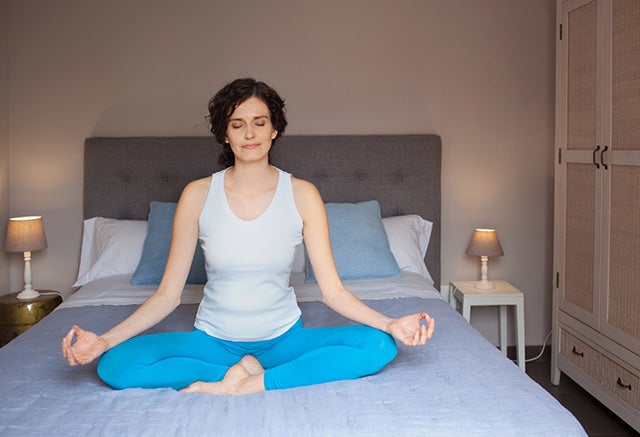
When you set up a time during the day to meditate, it becomes easier to develop the practice as a habit, and you are more likely to do so on a daily basis.
For instance, you could wish to match meditation with existing daily practice, such as journaling before bed or after taking a shower in the morning.
• Clear Your Mind
Immediately entering meditation following a difficult work meeting may not be the best course of action. After these stressful events, it may be more difficult to sit quietly and settle your mind.

Therefore, take a few minutes to unwind before beginning your meditation practice. This can assist in preventing the mind from wandering back to something mentioned during the discussion, allowing you to concentrate more effectively.
• Avoid Excessive Movement

Throughout your meditation, it’s natural to feel restless and desire to shift positions. If you’re too distracted or if you experience pain, you may adjust. However, avoid allowing your position to become a distraction in and of itself.
There are numerous styles of meditation to choose from, and some of them allow for alternative postures such as walking to lying down.
• Cut Yourself Some Slack
At its heart, meditation will teach you how to treat yourself with love regardless of what you are going through at the time.

As with exercise, some days will feel more effortless than others. This could be because you slept poorly the night before or were under a lot of stress that week. Bear in mind that this is a meditation practice; it will not always be flawless.
• Use a Meditation App
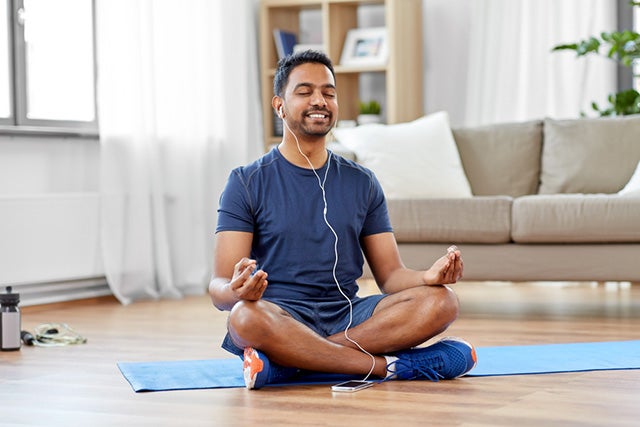
If you have no idea where to start, you can always use a meditation app to guide you through the process. Not only can an app guide you, but it can also hold you accountable. This way, it’s easier to adopt meditation as part of your daily routine.
You might want to read this: The Best Relaxing Music for Sleeping
How to Choose the Best Meditation App for You
• Guidance
The level of the direction you like is highly subjective, just as some people prefer to run alone while others prefer to participate in a group exercise class. Consider how much assistance you require from a meditation application.
Consider how you prefer to work out to get some ideas. You might be surprised at what you discover.
• Progress Tracking
Because this technology is particularly sought after by beginners, several apps include their own built-in learning system. Most will provide you with a free initial session or two but will then encourage you to upgrade as you use it.
Typically, this “development” is quantified in terms of time spent in meditation and your dedication to the practice.
Traditionally, meditation has not been about any specific, quantifiable improvement other than your own subjective experience. The purpose of meditation is to move inward and increase your awareness, which is not contingent on establishing goals or keeping track of time.
While these characteristics are advantageous when developing your practice, it is not recommended that you teach yourself to rely on this type of analysis. Take it for what it’s worth but strive to finally become self-sufficient in your practice.
• Duration
How long do you expect to spend meditating throughout each session? Some apps are designed for short-term meditation that you can fit into your schedule at any time of day, while others require a bit more dedication.
When using highly configurable software, you will be able to choose from an extensive range of session durations.
• Accountability
Are you the type of person who can stick to their own objectives and benchmarks, or are you more receptive to outside pressures and accountability? See whether you can set a reminder for yourself or turn off the reminders when you aren’t using them on the meditation app you are considering.
• Audio & Video
Consider whether you prefer audio or visual cues when meditating, especially if you are participating in guided meditation.
Many meditation applications are audio-based, making them excellent for listening to when you’re sitting somewhere, such as on public transportation, with your eyes closed.
Others are video-based and are more suited for at-home practice because they allow you to observe and follow along in a more private environment. Which would be most likely to keep you hooked and interested in the rest of the story?
• Price
What amount of money are you willing to spend on a meditation application? While some programs are completely free, others are only available for free up to a certain extent. Many meditation applications allow you to subscribe monthly, annually, or lifelong.
Best Meditation Apps
1. InsightTimer
Key Specs:
- Compatible with: Android, iOS
- Best feature: more than 45,000 free talks/sessions/meditations
- Free trial: yes, unlimited
Best for all ages
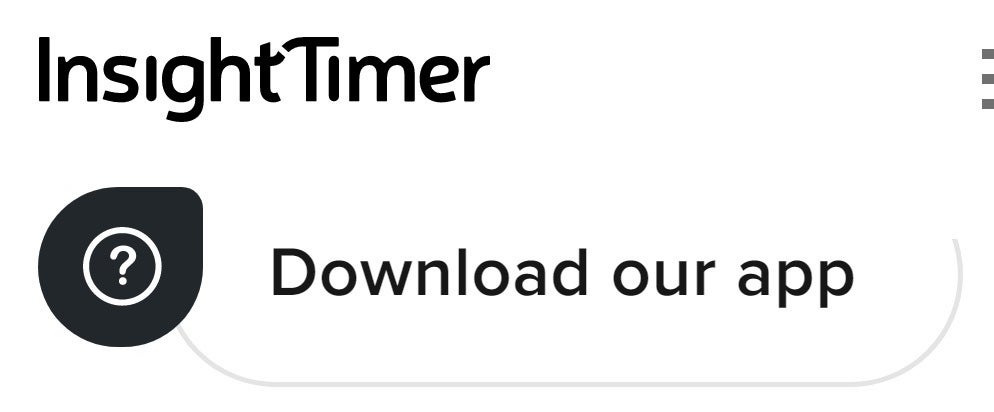
InsightTimer is a series of guided meditations available for free. The app contains a wealth of free content and the ability to subscribe for premium features. Premium access is estimated to cost around $60 per year.
Individuals can utilize the timer in the app to track their meditation practice. Individuals who prefer not to employ guided meditation may benefit from this function.
| Pros | Cons |
|
|
2. Headspace
Key Specs:
- Compatible with: iOS, Android, computer browsers
- Best feature: downloadable meditation sessions
- Free trial: yes, 7 or 14 days
Most user-friendly interface
Headspace is bright and simple to use, with animations guiding and explaining the tasks. Individuals might decide on a brief meditation session or a longer session. Additionally, the app includes sessions for movement, wake-up, and sleep.

You can download the app for free to view basic content or pay for Headspace Plus, a monthly or annual membership service that they can cancel at any time. Additionally, the app contains a library of free content titled “Weathering the Storm,” which is accessible to anyone.
| Pros | Cons |
|
|
3. Calm
Key Specs:
- Compatible with: Android, iOS
- Best feature: flexible programs
- Free trial: yes, 7 days
Most popular
With more than 100 million downloads, Calm is one of the most popular meditation apps out there. The app includes soothing music, masterclasses, and moderate activity regimens with meditation sessions.

Additionally, individuals can listen to famous personalities recite sleep stories. These are what Calm refers to as grown-up bedtime stories.
A person can begin with a seven-day meditation program to familiarize themselves with the fundamentals of meditation before progressing to a 21-day program. This strategy may benefit individuals who seek to develop a consistent meditation practice and track their improvement over time.
| Pros | Cons |
|
|
4. iBreathe
Key Specs:
- Compatible with: iOS
- Best feature: free to use
- Free trial: yes, unlimited
Best free app for iOS
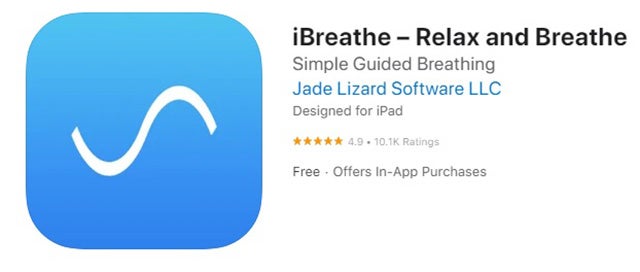
iBreathe is a straightforward yet effective tool for guiding you through deep breathing exercises. Whether you’re experiencing stress, anxiety, sleeplessness, or simply want to meditate and relax, this app offers an intuitive, attractively designed user experience.
In contrast to other apps, is created with simplicity in mind and is devoid of clutter, and is pretty simple to figure out. Other features worth mentioning include multiple color themes, Apple Health integration, and even customizable breathing intervals.
| Pros | Cons |
|
|
5. The Mindfulness App
Key Specs:
- Compatible with: Android, iOS
- Best feature: customizable meditation sessions
- Free trial: yes, with in-app purchases
Best for beginners
The Mindfulness App is an excellent place to start for novices, so we’ll begin here. It is an iOS application that teaches you how to be aware.

You will begin with a five-day introduction to mindfulness, including guided meditations to familiarize you with the practice. Additionally, it includes scheduled sessions ranging from three to thirty minutes in length, as well as the flexibility to customize your meditations.
Suppose you’re willing to delve into your pocket for additional content. In that case, the app also provides a premium subscription that includes classes on relationships, attention, and peacefulness and more than 250 guided meditations.
| Pros | Cons |
|
|
6. Let’s Meditate: Meditate, Relax & Sleep
Key Specs:
- Compatible with: Android
- Best feature: no annoying ads
- Free trial: yes, unlimited
Best for Android
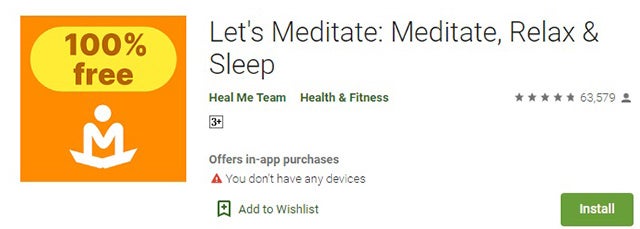
This app is another great choice for Android users who want a free meditation app to guide them. It offers a very plain approach to guided meditation; there is no clutter and no distracting background music. Simply select music and press the play button. It’s about as straightforward as it gets.
You can use meditation tracks that are as short as 5 minutes to take a quick break from your daily routine. You also have access to longer meditation tracks that run over 40 minutes to completely recharge your batteries.
| Pros | Cons |
|
|
7. Inscape
Key Specs:
- Compatible with: Android, iOS
- Best feature: lots of training
- Free trial: yes, 7 days
Editor’s choice
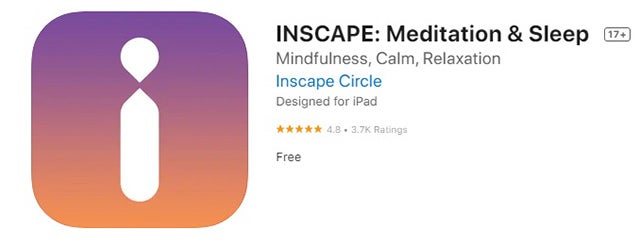
Inscape begins with a three-day orientation. All of Inscape’s meditations are delivered by the same voice.
There is a great deal of training here, so if your mind is active and you have difficulty focusing, particularly during meditation, Inscape provides activities for each meditation. You gradually work your way up to silent meditation, which may be your ultimate goal.
| Pros | Cons |
|
|
8. Breethe: Meditation & Sleep
Key Specs:
- Compatible with: iOS, Android, website for desktop
- Best feature: also good for sleeping
- Free trial: yes, 14 days
Best for sleep
The Breethe meditation and sleep app is one of the most comprehensive options for developing a daily habit of thoughtful self-care. With over 1,500 songs, you’ll never run out of guided meditations to assist you in overcoming life’s obstacles or relaxing music to help you sleep better.
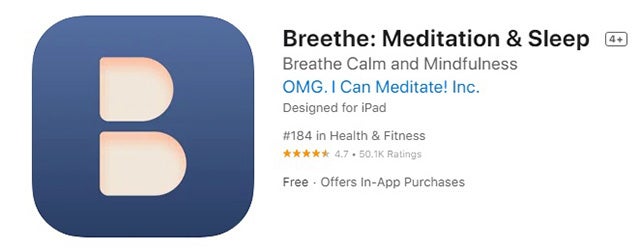
Additionally, it provides numerous learning methods to meditate and incorporate it into a healthy lifestyle.
When you first open the Breethe app, it will prompt you with a few easy questions. These factors influence how the software configures your regular meditation program. Take note that Breethe has a big catalog of meditation songs.
| Pros | Cons |
|
|
In Conclusion
All of the meditation applications on this list can assist in harnessing the healing properties of meditation with a single flick of your finger.
Whether you’re new to meditation or an experienced practitioner seeking structure, there’s an app for you that will assist expedite the process and answer any concerns you may have along the way. And be sure to check out our other guides, like our list of the best sleep masks!
Photo credit: Dasha Petrenko/Shutterstock; fizkes/Shutterstock;
Iryna Imago/Shutterstock; CHAjAMP/Shutterstock;
goffkein.pro/Shutterstock; Monkey Business Images/Shutterstock
